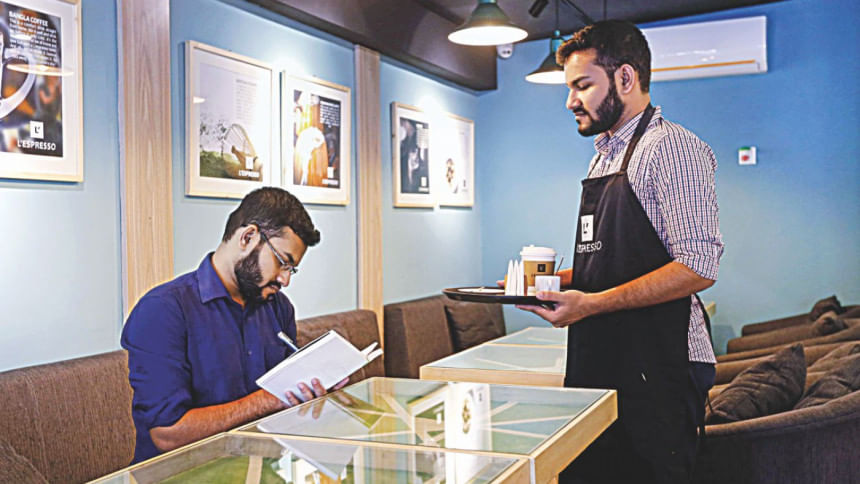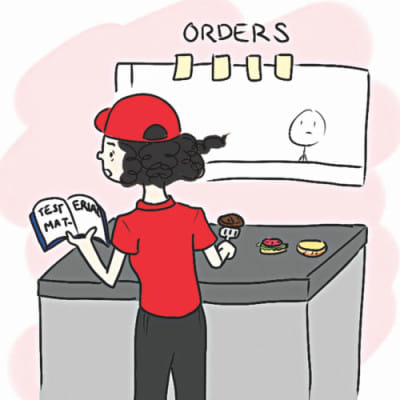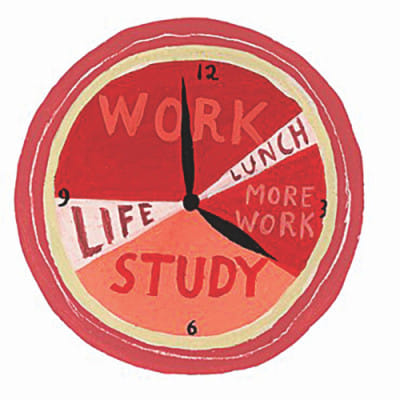Juggling Work and Academics

It can be said without a shred of doubt that Dhaka is an expensive city. A ten minute distance from your house on a rickshaw costs about forty taka. Want to hangout with your friends or eat somewhere you won't get food-poisoning? That'll take a 500 taka note out of your wallet. These everyday expenses are unavoidable and can cause a massive dent in your savings account and a mere weekly allowance doesn't cut it. Which is why, so many students take up jobs to financially emancipate themselves as well as learn a few essential life skills along the way. However, balancing a part-time job alongside academics can be incredibly challenging. So how do they do it?
For university students the task of working and studying is like competing for the Olympics, where unprecedented quizzes, class cancellations and rescheduling, and assignments acts as obstacles between reaching the estimated goal. "I often find myself holding a book on my way to university or work when I have an important exam coming up. It gets tricky to maintain a strict schedule where you decide the hours you get to study and work — but you have to make do." says Ishrat Jahan from North South University, who works as a sub-editor for a leading magazine in Dhaka.

On the other hand, the way a student manages their education and work is largely contingent upon the sort of working atmosphere they belong in. Aaqib Hasib from Brac University, who worked part-time at a call centre based in Dhaka, shares his experience working there saying that his job left him burned out which lead him to leave it eventually. "I worked around twenty hours a week at the call centre. There was barely any flexibility in the workplace. You don't come, you don't get paid. If you miss three days without notice, you're fired. And if you're ten minutes late, they'd dock an entire hour of your pay." He adds, "My classes ended at 3:30 and I would end up waiting at BracU till it was time for work so that I don't end up late at work." So it seems that finding the right job that allots healthy breathing space for students to operate is extremely is a basic necessity that needs to be adhered.
An employer is an important stakeholder in the discussion of creating a better workplace environment for student workers. It's important that employers recognise that student workers come from a completely different discipline and lifestyle as opposed to students who have graduated and taken up jobs, as student workers have to ensure good grades alongside their work. Flexibility and good communication is key when it comes to making sure they deliver to their maximum potential as students look forward to taking away important skills from their job alongside earning cash. On this note, Shahriar Shahid, CEO and co-founder of Imagine Radio says, "The first thing that an employer needs to clear out is the organisation's requirement from the student and the details of their responsibilities.

It's often seen that employers fail to understand the type of value students add to the demography of the workplace and disproportionate expectation can create a lot of misunderstanding between the two parties." He further adds that employers need to acknowledge that many students are coming to work with little to no experience or background and that leads to them failing to understand the organisation's perspective and objective, however in circumstances as such, employers need to take out the time to teach and then expect results out of a student. However he believes that a smooth workplace dynamic between employers and students is a two-way street and students should also fulfil their end of the commitment. He says, "While the priority for a student should always be their education, once a student opts into working for an organisation, they need to realise that their commitments to the organisation is also important. They need to keep in mind that if they can't keep their commitments, the organisation might suffer. I personally believe organisations should employ students as they carry current sentiments and ideas, which usually adds valuable input that strengthens the entire team."

The task of maintaining a job and education can get easier when there is an overlap between the two. Sadia Nusrat Siddique, a student of IBA, University of Dhaka who works as a Marketing Executive at Star Cineplex engages on this issue and says, "Being in IBA has helped me a lot in the balancing. I'm a marketing major, so my projects for Cineplex often helped me in my assignments for my coursework. If anything, working while studying has improved my grades overall, because I could actually implement things I learnt in the classroom in my workplace."
Living in a demography that is moderately conservative, balancing jobs and studies can get incredibly difficult especially for women as most parents are typically concerned for their child's safety in the workplace. Ansa Tastiha Suhi, a first year student from ULAB has been working as a barista at North End Coffee Roasters for over ten months. She says, "At first my parents were concerned because they didn't have a proper idea of what a barista does. It took them a bit of time to wrap their heads around the profession but once they understood what my work entails and were assured that my workplace is safe, they were fine by it." When asked about the struggles of being a barista, Suhi responds saying that often people mistreat baristas thinking it's a profession that doesn't deserve a lot of respect, however the reason why she still loves working as a barista is that it helped her develop interpersonal skills that allow her to deal with people coming from all walks of life.

However, it often gets incredibly difficult to get parent's approval on one's job as they often stick to the prejudice that part time jobs are a waste of time. Protyasha Ghosh, a student from Brac University who also works as a barista at North End Coffee Roasters says, "My father never understood why I took the job. He thought it was about the money but money was never the issue. I've always wanted to have the experience of working as a barista."
Aaqib Hasib engages on the aforementioned issue and says, "My parents were pretty indifferent to be honest. Some people would occasionally judge that I worked in a call centre. But it really didn't bother me much. I was working for the money, and I personally knew the hard work I was putting into the job and their judgement didn't add into the equation"
While there are drawbacks of working part-time, there is a lot one can take away from it as well. Protyasha says, "I am an introvert and I am generally uncomfortable talking to people in my day to day life however my job helped me blossom and break out of that. I learned how to multitask and deal with people; something I wouldn't have been able to learn as I did in depth while working as a barista." Sadia Nusrat Siddique says, "I believe my time in Cineplex has taught me the value of hard work and being humble, and I believe no other qualities are as important as these two in any workplace."

Although having a job has many perks and benefits, there's always the possibility of overworking oneself while juggling academics and work life, and as a result causing serious mental and physical breakdowns. While circumstances like these are often unavoidable, they need to be dealt with utmost priority as nothing can be more important than your own well-being. On this issue, Ishrat Jahan says, "Every person needs to religiously maintain an escape that allows them to rewind once in a while before coming back to reality. It's important to have your own defining moment which helps you to decide what you should or shouldn't opt for next."
Working part-time jobs is an essential character building and skill inducing phase in a student's life but it isn't a piece of cake. However, knowing what you want and watching out for what is good for you can make the process of getting-by easier. While working is important, it's essential to make sure that it doesn't affect your health and in order to do that, make sure to communicate with your employer about your struggles and don't treat it as a weakness.
Nazifa is a twelve year old trapped in a twenty year old body, who is afraid of the dark and believes melted cheese is the solution to all of life's problems. Send help at [email protected]





Comments